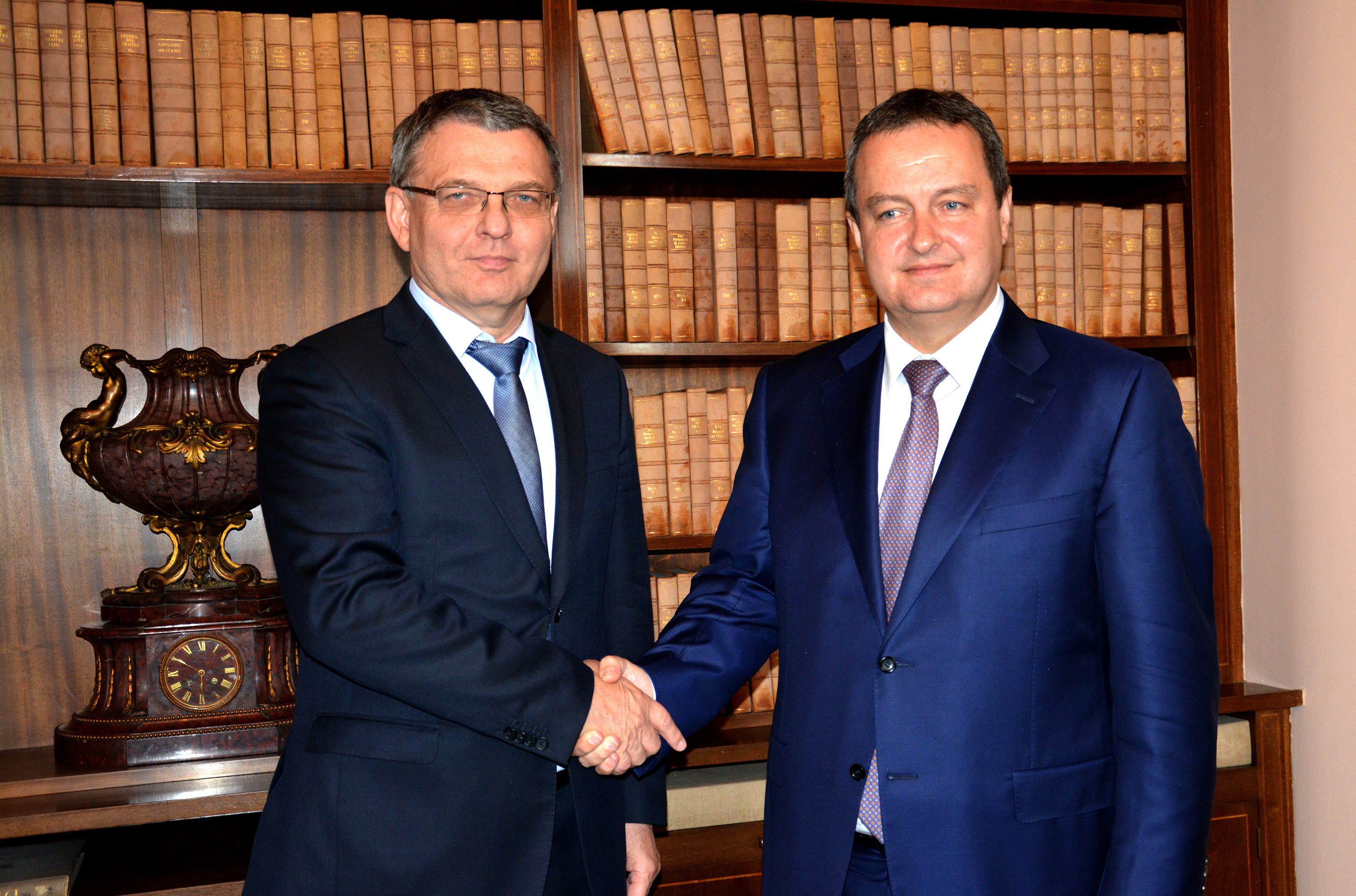



| Tuesday, 15 September 2015. | |
| Visit of Foreign Minister Dacic to the Czech Republic | |
| + larger fontnormal font- Smaller font |
 First Deputy Prime Minister and Minister of Foreign Affairs of the Republic of Serbia Ivica Dacic, who is paying a two-day visit to the Czech Republic, talked today with the country’s top officials. The Serbian Foreign Minister met with President of the Senate Milan Stech, Prime Minister Bohuslav Sobotka and his counterpart, Foreign Minister Lubomir Zaoralek. First Deputy Prime Minister and Minister of Foreign Affairs of the Republic of Serbia Ivica Dacic, who is paying a two-day visit to the Czech Republic, talked today with the country’s top officials. The Serbian Foreign Minister met with President of the Senate Milan Stech, Prime Minister Bohuslav Sobotka and his counterpart, Foreign Minister Lubomir Zaoralek.After the meeting with Minister Zaoralek, Dacic expressed his satisfaction with the visit to the Czech Republic, underlining that the relations between Serbia and the Czech Republic were traditionally good and recalled an interesting fact that Masaryk was a holder of a complimentary Serbian diplomatic passport, issued to him in London by the Government of the Kingdom of Serbia. “The Czech Republic and the Republic of Serbia wish to continue their good relations and cooperation in all areas. We are particularly looking forward to the visit of the Czech Prime Minister and the opportunity of having discussions with the Serbian Prime Minister on cooperation, especially in the economic area. Foreign Trade between Serbia and the Czech Republic exceeds 600 million euros and is good, but can be much better. There are considerable opportunities in the areas of energy, transport, infrastructure, etc. I am confident that there are many additional opportunities for improving our cooperation. We are working on signing further bilateral agreements in various areas. We are grateful to the Czech Republic for the significant support extended to Serbia in its EU integration process and for its expressed desire to intensify the relations, meetings and visits at the highest level. Serbia, like the whole of Europe, has a lot of problems with the migration crisis, to which it is not connected in any other way except by being a transit territory. Some 140,000 migrants have passed through, of which 550 have applied for asylum in Serbia. Everybody wants to go to Western Europe. A specific problem of Serbia, which makes it different from other countries, is that control at the external borders of the EU or Schengen Area is being tightened, whereas migrants are arriving in Serbia directly from the EU - from Greece and Bulgaria. Which borders should Serbia be tightening then? For this reason, we appreciate the needs of every country of the European Union to protect its national interests. We are not very happy about the fact that this, symbolically, sends a bad message. We will not impair our relations with those countries and we urge the European Union to reach a common solution as soon as possible. What we in Serbia certainly do not want is to end up as victims. All migrants are returning to where they came from, that is, to where they had been registered. Wishing to be a member of the European Union and in line with its obligations as a candidate country, Serbia has respected the EU rules, unlike other countries. We showed a high level of responsibility, as demonstrated by the fact that no incidents were provoked by Serbian citizens that could be interpreted as anti-migrant. This is a major crisis that the European Union is facing; it must therefore come up with a serious response and a clear plan. There is no doubt that neither Serbia nor the Czech Republic can have much influence on that. I would like to reiterate that Serbs are and have always been your brothers in the Balkans, in our long history. Even our great emperors, Karl and Dusan, had communication - they even wrote letters to each other. For all these reasons, we should close our ranks a lot more. That is why I am looking forward to the arrival of my colleague in Belgrade. I hope he will come on a bilateral visit, and to the OSCE Ministerial Council in Belgrade, in December”, said Minister Dacic. |